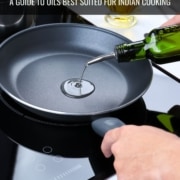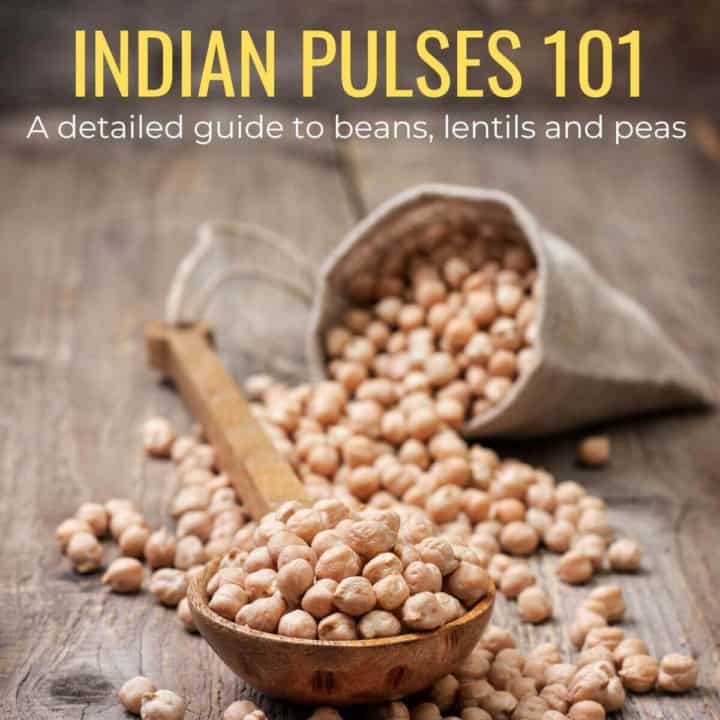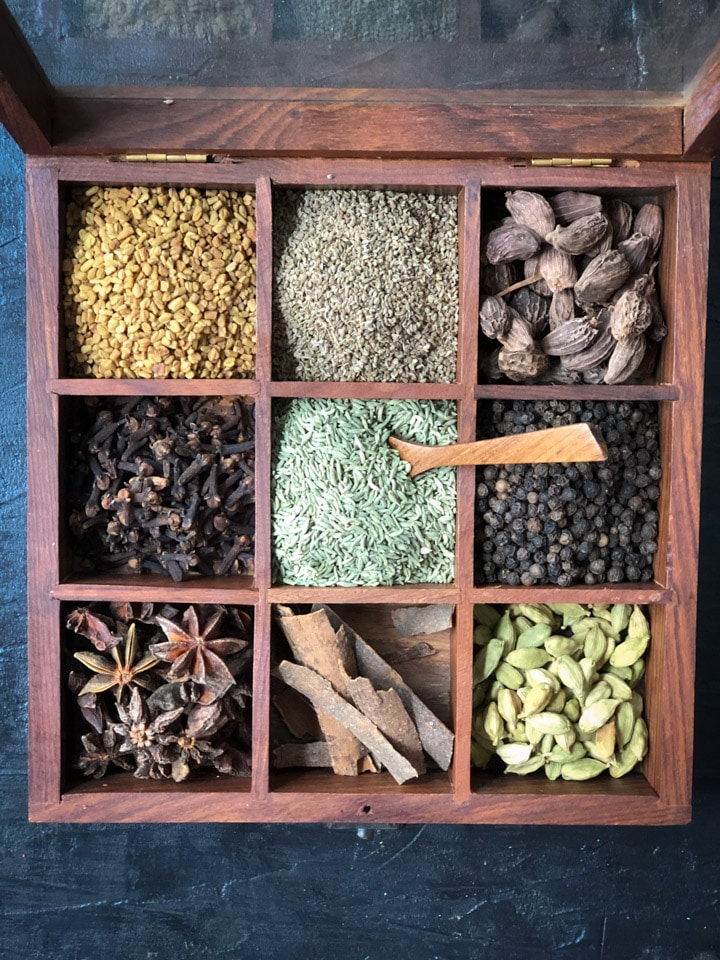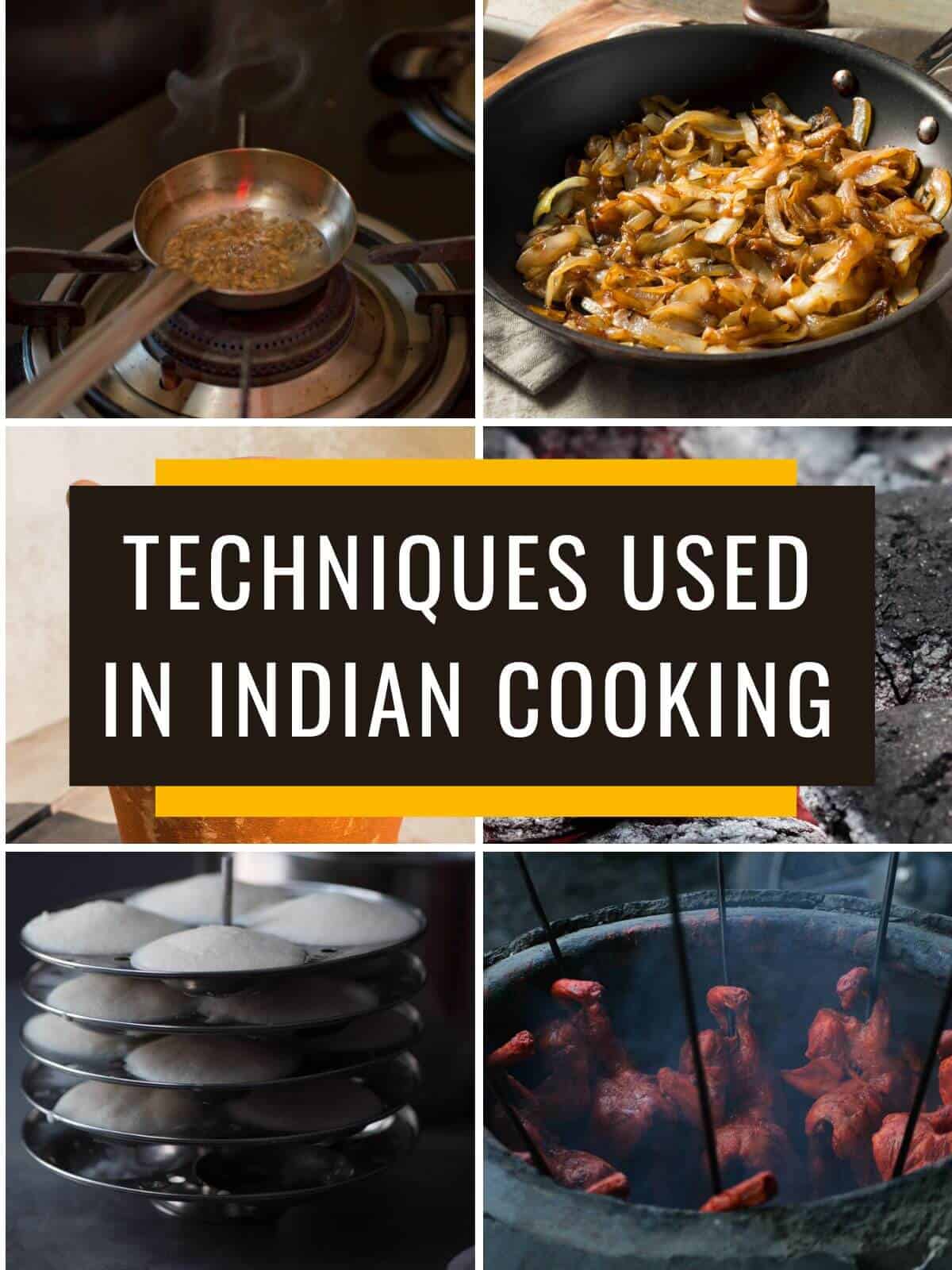Best Oils For Indian Cooking
Note: This post contains affiliate links. As an Amazon Associate I earn from qualifying purchases.
Best oils for Indian cooking – With the variety of oils available in grocery stores, it is often overwhelming to pick the one that would be right in terms of nutrition value, taste, and smoke point. This post is an attempt to eliminate confusion and help you pick the right oil for Indian cooking.
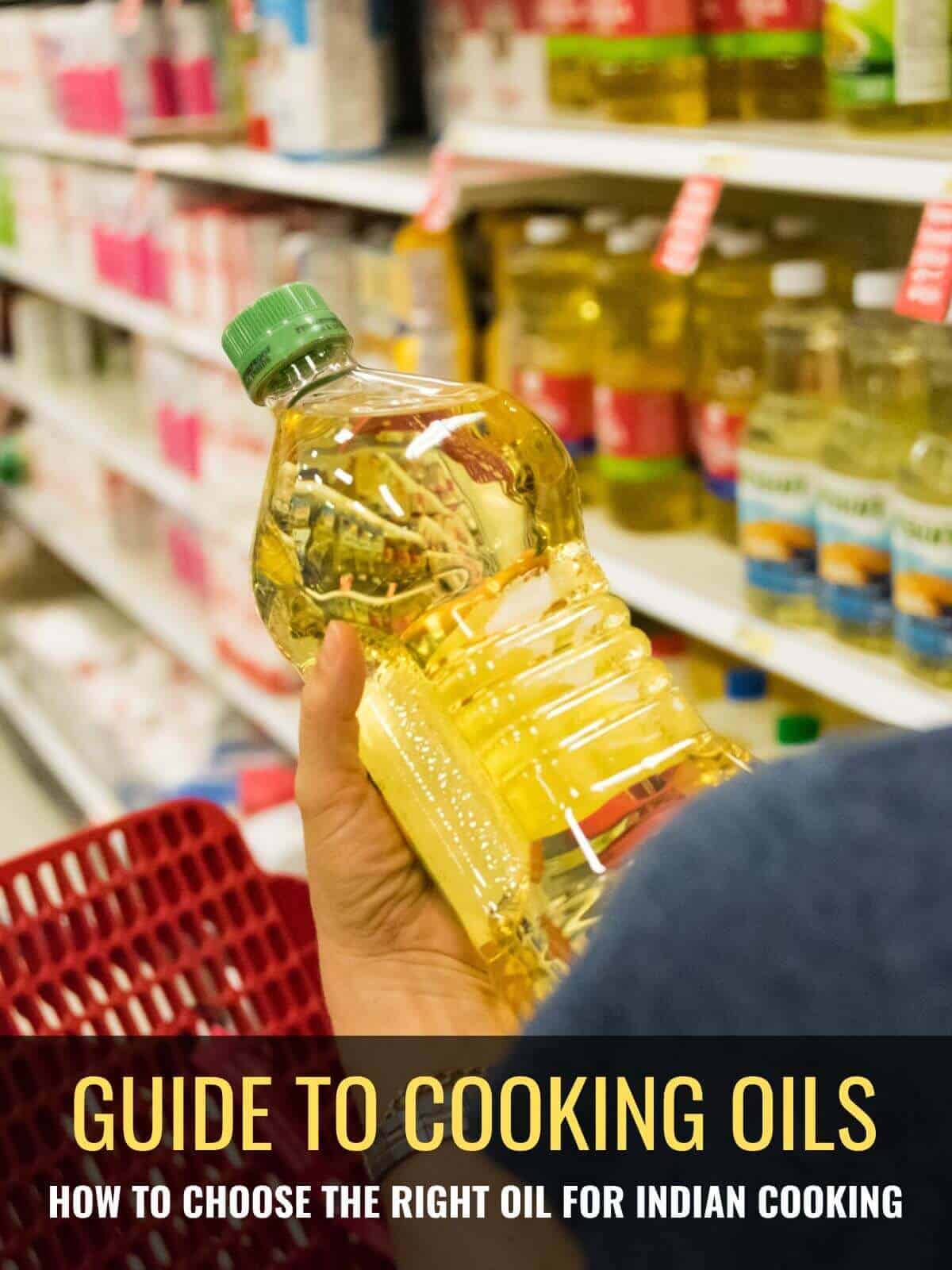
Indian food is known for its diversity. How a dish is cooked depends primarily on the region and cooking style. Choosing the right kind of oil is important since it not only makes a huge impact on the nutritional value of the dish but also the taste and aroma.
How to choose the right oil for Indian cooking
Be mindful of the fat content
Oils are made of fats, and some are better than others. Use the following guidelines –
1) Use unsaturated fats such as monounsaturated and polyunsaturated fats
- Monounsaturated fats are heart-healthy fats that you can find in oils such as peanut, avocado, olive, rice bran, and almond.
- Polyunsaturated fats are essential fats that our body can’t generate. They are found in vegetable oils such as sunflower, safflower, soybean, walnut, and corn. They lower LDL (bad cholesterol), increase HDL (good cholesterol), and also, help keep blood sugar in check.
2) Limit saturated fats, especially the ones made from animal fats (e.g., lard, duck fat, etc). These are detrimental to cardiovascular health. Coconut oil and ghee are saturated fats that promote good health (source – why coconut oil is not poison and why ghee is good for you).
3) Avoid Trans Fats – They are unsaturated fats that are converted into saturated fats by hydrogenation to increase their shelf life. Trans fat raises LDL (bad cholesterol) and lowers HDL (good cholesterol). Examples of trans fats are Vanaspati, margarine, shortening, etc. It is cheap and is therefore commonly used in restaurants, processed foods, store-bought cakes, and pastries – in short, wherever food is mass-produced.
Use unrefined (cold-pressed oils) instead of refined oils
Cold-pressed oils (kacchi ghani) are extracted in a heat-controlled environment, yielding a high-quality oil that retains nearly all its natural nutrients. Extracting refined oils involves using high heat and chemical solvents. This destroys the flavor and nutrients in oils. More info in this video – All about oils.
Choose oils based on what you are cooking and what technique you are using
Oils with a low smoking point can be used for sautéing, whereas oils with a high smoking point should be used for deep-frying.
Note – The smoke point is the temperature at which oil starts to burn and smoke, imparting a burnt flavor to the dish.
- Oils with low smoking point (burns easily) – Cold-pressed oils (with the exception of coconut and avocado).
- Oils with high smoking point (don’t burn easily) – Ghee, Coconut Oil, Avocado oil
Recommended oils for Indian cooking
Indian cooking has typically made use of coconut, peanut/groundnut, sesame, mustard oils, and ghee for cooking, depending on what was available in the region. Keeping our cultural heritage in mind and also bearing in mind the advent of new oils such as avocado and rice bran oils, here are my recommendations –
- Ghee – for tempering, deep-frying, biryanis, and desserts
- If you don’t want to use ghee for deep-frying, you can use Avocado oil or Rice bran oil instead.
- For everyday cooking (sauteing and pan-frying), pick two unrefined, cold-pressed oils of your choice from this list and alternate between them (more info on this in the FAQ section below).
- Peanut (groundnut) oil
- Mustard oil (for making Indian pickles and North Indian & Bengali dishes)
- Sunflower oil or Safflower oil
- Sesame oil (gingelly or til) – Used in South Indian dishes from Tamilnadu and Andhra/ Telangana
- Coconut oil – for tempering, baking, South Indian cooking, deep-frying
- Specialty oils include Olive oil (for Italian dishes and baking), toasted sesame oil for Indo-Chinese, Thai, and Chinese cooking.
Note – There are a host of other oils that are available in the market, such as canola oil, corn oil, and soybean oil. They do have their own benefits, but the oils listed above are best suited for Indian food.
I think it is best explained in an infographic, so here’s one for those who are visual learners.
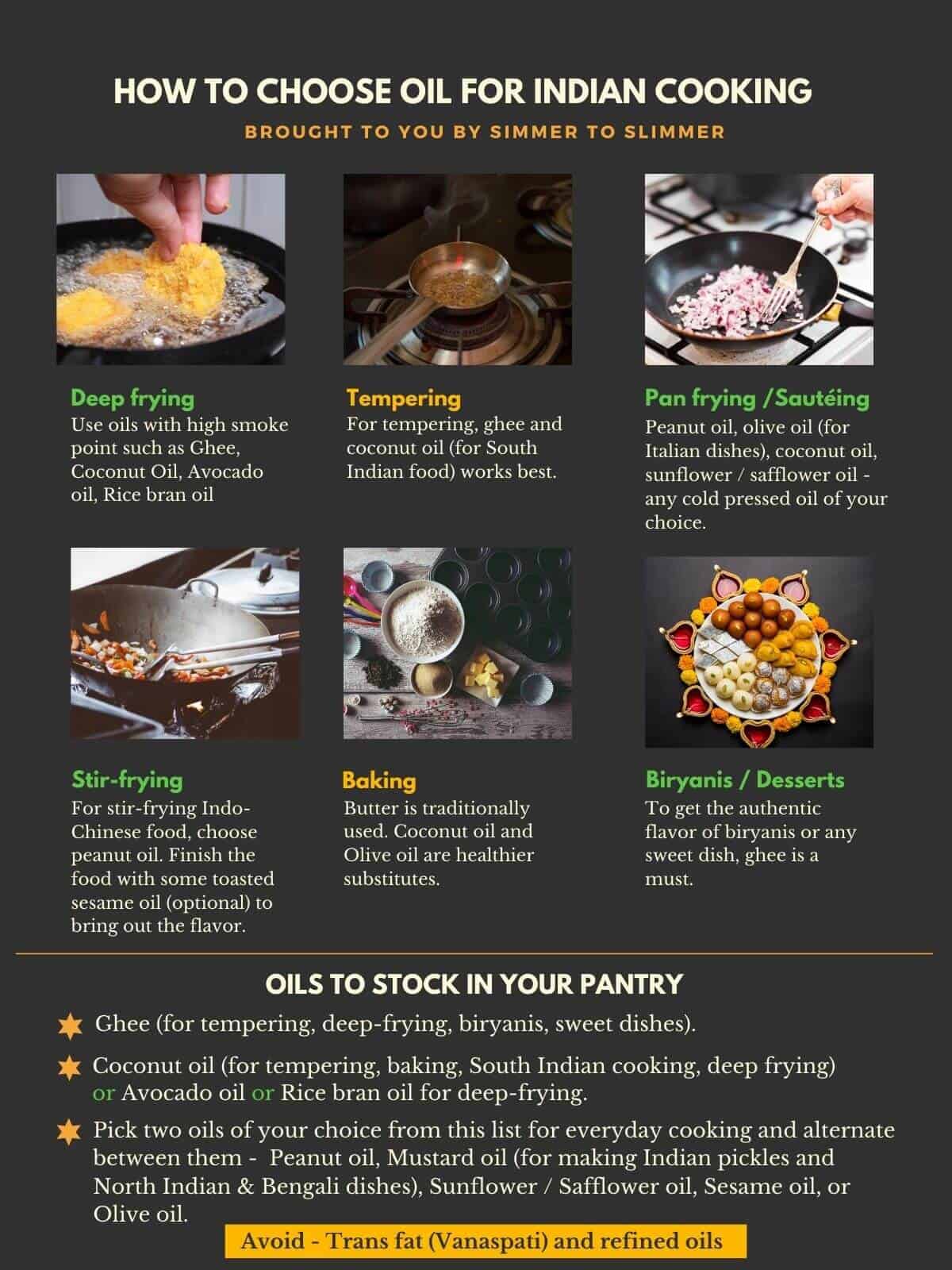
How to store oil?
Store oil in a cool, dry place and away from direct sunlight. Follow the directions of the manufacturer on the expiry date.
Should we blend oils?
My only argument against it would be that cold-pressed oils have a strong aroma and flavor, which might impact the dish’s taste. Instead, you could always stock different kinds of cold-pressed oils and choose the oil to cook based on the region that the dish originates from.
Should we switch oils frequently – say, every 3 months?
Instead of changing the oil every 3 months, switching oils for every meal is best so that you get a healthy dose of polyunsaturated fatty acids such as Omega-3 (nut-based oils) and Omega-6 (vegetable-based oils) daily.
Can you reuse cooking oil after deep frying?
It may not be practical to throw away deep-fried oil, so most folks reuse it. The problem with reusing oil is that the smoke point reduces every time it is reused. Reusing oil that has been heated past its smoke point produces free radicals that are detrimental to our health in the long run.
So, here are the guidelines I follow –
- Use only oils that have a high smoking point for deep-frying.
- Please don’t reuse the oil for deep-frying again; instead, use it for everyday cooking (sautéing and pan-frying).
To reuse oils, follow the instructions below –
- Let it cool down completely.
- Strain to remove food particles and prevent the oil from going rancid.
- Store in a cool, dry place.
- Reuse the oil for similar food items.
- Get rid of it after 2 months or after 2 uses. Also, discard if the oil becomes thick and sticky.
How to dispose of cooking oils?
Do not drain it in the kitchen sink or toilet bowl. Instead, put it in a sealable container and discard it in regular garbage.
Quick Summary
- Avoid trans-fat and use unsaturated fats for your daily cooking.
- Limit saturated fats from animal fats. Not all saturated fats are bad for you – for example, ghee and coconut oil.
- Avoid refined/fortified oils and choose unrefined, cold-pressed oils instead.
- Buy cold-pressed oil in small batches because it can go rancid quickly.
- Oils with low smoking points should be used for sautéing, whereas oils with a high smoking point are used for deep-frying.
Indian Cooking 101 series
New to Indian cooking? Here are a few helpful posts to get you started!
This post was originally published on 07/06/2019, and the text and images were updated on Nov 6, 2023.

